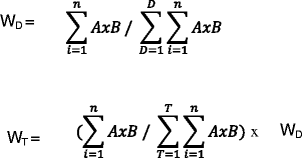Advancing a new evidence-based professional in health care: job task analysis for health and wellness coaches
- PMID: 27349746
- PMCID: PMC4924333
- DOI: 10.1186/s12913-016-1465-8
Advancing a new evidence-based professional in health care: job task analysis for health and wellness coaches
Abstract
Background: The pressing need to manage burgeoning chronic disease has led to the emergence of job roles such as health and wellness coaches (HWCs). As use of this title has increased dramatically, so has the need to ensure consistency, quality and safety for health and wellness coaching (HWC) provided in both practice and research. Clear and uniform role definitions and competencies are required to ensure appropriate scope of practice, to allow best practices to emerge, and to support the implementation of well-designed, large scale studies to accumulate a rigorous evidence base. Since the nascent field is replete with heterogeneity in terms of role delineations and competencies, a collaborative volunteer non-profit organization, the National Consortium for Credentialing Health and Wellness Coaches (NCCHWC), has been built over the past six years to support professionalization of the field.
Methods: In 2014, a professionally led Job Task Analysis (JTA) was conducted with 15 carefully selected subject matter experts (SMEs) with diverse education and professional backgrounds who were practicing HWC in a wide variety of settings. After establishing a thorough list of specific tasks employed during HWC, the expert panel discussed the knowledge and skills necessary to competently perform the tasks. Subsequently, a large validation survey assessed the relative importance and frequency of each identified job task in conducting HWC.
Results: The JTA identified 21 job tasks as essential to HWC. In the subsequent validation survey, 4026 practicing health and wellness coaches were invited to rate each of the 21 job tasks in terms of their importance and frequency. A response rate of 25.6 % provided a diverse sample (n = 1031) in terms of background, and represented a wide variety of training programs from academia, industry, the private sector and associations. Per best practices, the subset of practicing HWCs (n = 885) provided importance and frequency ratings to be used to calculate task and domain weights that can serve as a foundation for a NCCHWC national certification examination.
Conclusions: This JTA provides a significant step forward in the building of a clear and consistent definition of HWC that will allow for uniform practice standards and enable more stringent methodology to evaluate this promising approach within evidence-based medicine.
Figures
References
MeSH terms
LinkOut - more resources
Full Text Sources
Other Literature Sources
Research Materials
Miscellaneous


